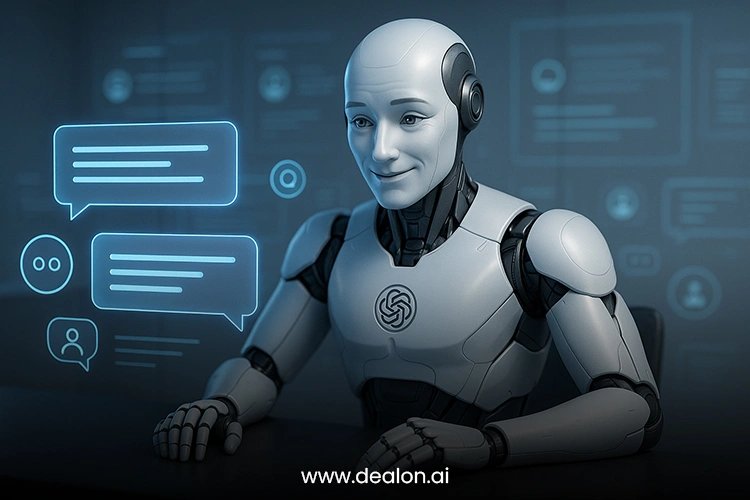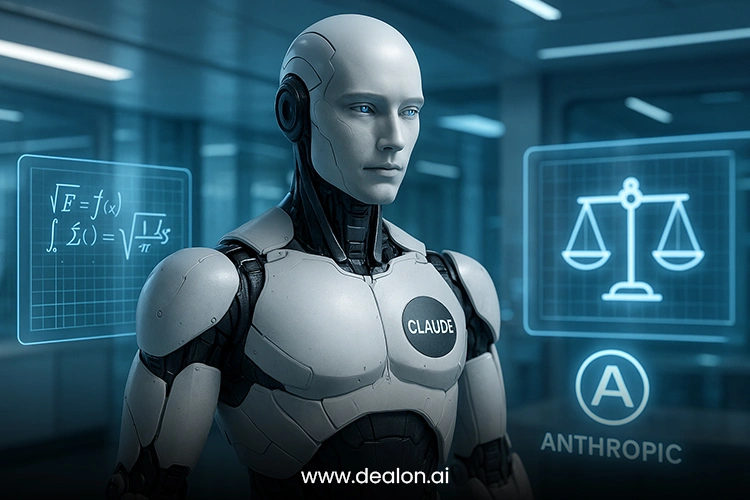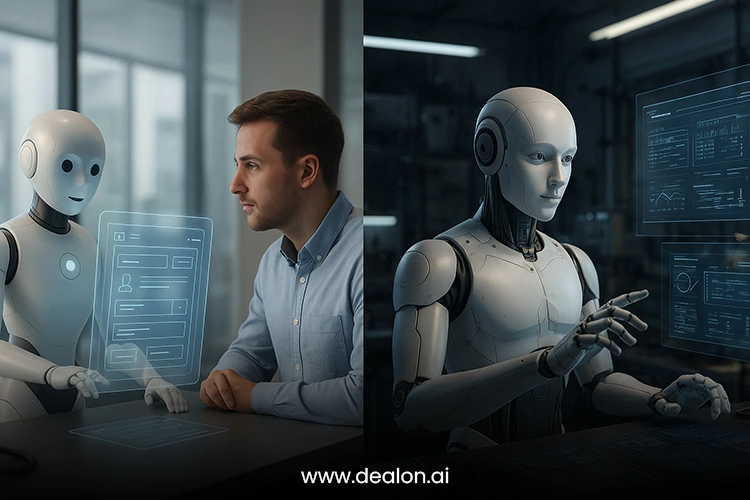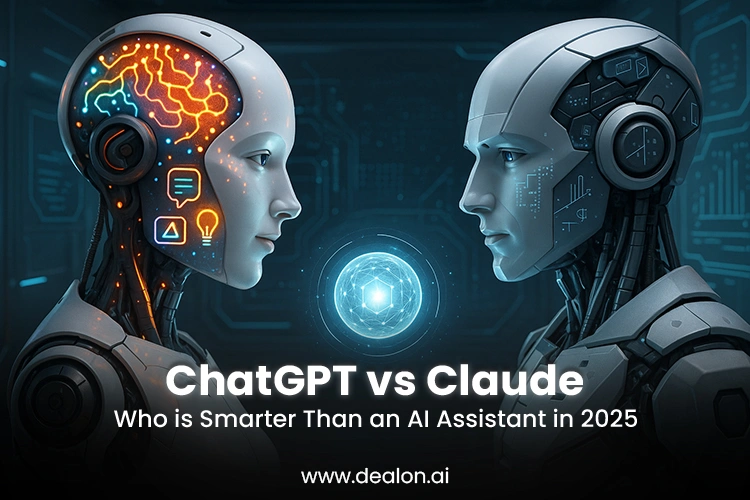Amid the fast-paced development of the sphere of artificial intelligence, two of the most powerful AI assistants, ChatGPT and Claude, are in competition to become the rulers of the sphere of AI solutions in 2025. Both driven by the latest in machine learning algorithms, these AI assistants have revolutionized how people can interact with technology, with a massive assortment of uses, all the way to issues, divorce, and even marriage. So, which one can be deemed as a more intelligent choice?
The distinction between the two robust systems has come under constant erasure as AI is the technology that keeps growing. OpenAI has been touted as the creator of ChatGPT, which has established itself over time as a conversationally expressive and adaptable platform capable of performing an enormous variety of functions, including content generation, supporting customer support, and creative activities. It is made to fit in a variety of situations and give intelligent answers on a range of subjects, and it will be the best option for individuals who need a conversational and flexible AI.
In contrast, Anthropic produced Claude, which pays special attention to safety, alignment, and logical correctness. The thrust behind its development is making AI responses safe and strictly governed responses, which can provide highly contextual, specialized information. The high levels of capabilities, such as Claude, are particularly valued in technological fields where thorough analytical and ethical sensitivity play a significant role in determining success.
This paper will do just that, as we compare ChatGPT vs Claude and their distinctive features, strong suits, and applications in 2025. Analysis of their performance will also enable us to determine which of these two AI assistants is smarter, by giving us an idea of how these two mechanisms are transforming the future of AI technology. Are you a professional who needs access to technical knowledge, or do you want an AI assistant with a more creative approach? Either way, the decision to use ChatGPT or Claude is sure to make a difference in your further steps towards the AI world.
Also Read: 6 AI-Powered Wearables Changing the Face of Health Monitoring
ChatGPT: The Conversational Intelligence

ChatGPT is a product of OpenAI and has been considered a leader in the domain of conversational AI. As of 2025, it has perfected its skills to such a degree as to go beyond the current standards concerning natural language processing. After all, ChatGPT is highly effective in performing punctilious interpretations of human language and flexibly adjusting to a variety of conditions and backdrops, as well as producing coherent, pertinent, and contextually suitable remedies. This effectively makes it an inter-industrial tool, as it is applicable in conversations like customer service, creation, education, and consultations, among others.
Strengths:
- Contextual Intelligence: Contextual intelligence is also one of the strongest features of ChatGPT because it allows it to keep track of context during long and complicated conversations. In contrast to the previous versions, which occasionally had trouble with consistency during the long-running talks, ChatGPT by 2025 learned how to comprehend subtle as well as extended multi-turn communications. This will enable it to keep up with conversations, capture the necessary information, and give answers that can be based on the previous engagements. As far as helping with technical queries and giving out personal advice goes, due to its understanding of context, it is a tool that can provide a great deal of help when an issue needs to be solved, through informed and holistic discussion.
- Vast Knowledge Trove: ChatGPT was trained on enormous data across many areas of pursuit. Such a lush database lends its capabilities of providing information and explanations across a vast range of topics, both scientific in its most complex ideas, and the most up-to-date pop cultural news. Since the knowledge base is so extensive, it has become a dependable source of information in many areas such as technology, business, education, and the arts.
- Adaptability and Creativity: ChatGPT can adapt to different user requirements, which is very impressive. It excels in creative assignments in addition to factual questions. If you are writing an essay, coming up with marketing ideas, or even poetry, ChatGPT adds a high dose of creativity to what it writes. It creates new ideas, helps to make creative writing, and can even imitate creative work, so it is a perfect tool when you need not only to be intelligent, but also to have a bit of new ideas and inspiration.
Claude: The 2025 state-of-the-art AI

Created by Anthropic, Claude has made inroads into the market as a powerful contender in the AI landscape, taking a new direction with a combination of sophisticated language-related processing and moral obligations. This AI assistant is named after the great Claude Shannon, who made an information revolution and designed it carefully, focusing on the spheres of safety, alignment, and logical accuracy. It has provided us with an idea of how intelligent automation can be done responsibly, and the framework he is presenting is something that will be part of our future lives as AI continues to take up more responsibilities in our day-to-day living.
Strengths:
- Safety and Alignment: Safety of AI interactions is one of the express features of Claude. Claude is not similar to many AI systems that have been criticized due to biased, harmful, or unsafe produced data, because it is constructed with being ethical at its core. Its makers have put stringent measures in place to check threats of producing outputs that may continue to discriminate, deceive, or give bad counsel. Through a constant process of adjustment to human values, it can make sure that the answers are going to be considered, not one-sided and unethical, particularly within the touchy spheres such as healthcare, legal counsel, and finance.
- Accuracy and Logic: Claude is the best when it comes to things that need logical thinking. It has a highly optimized architecture to achieve high precision, which makes it particularly useful in applications that require precision, most notably mathematics, computer science, and data analysis. Claude is capable of making giant leaps of inference and drawing conclusions based on complicated sets of data, which makes it a formidable tool in the hands of its professional users who require support with technical problem solving or when part of the code is buggy. It not only offers reliable insights, but also those that can be used to take actions that can solve complex equations or even study vast amounts of data.
- Specialization in the Tasks: ChatGPT is more diverse in terms of the functional fields that it can perform, but Claude is more specialised. It is tailored to a special purpose, e.g., at a high level of technical activities and decision making in complex systems. This gives it specific applications of research-oriented fields that need extensive and specific expertise. Being able to perform scientific studies, perfect algorithms, or find the optimal business solutions, Claude is more precise and efficient than any other tool available in niche domains.
Real-world Performance

Regarding practical implications, ChatGPT and Claude’s strengths become more evident depending on the course of use. Although both AI assistants can do an abundance of actions, they are both optimal in their specific fields, which is why they suit different needs and industries.
-
ChatGPT as a Customer Care:
ChatGPT is one of the exemplary options in the context of customer support. It has no match when it comes to conversational performance, especially with multiple-step requests. The capability to engage in complex customer service exchanges in quotidian and open-handed form is what makes ChatGPT an invaluable tool in the business sphere that endeavors to enrich its customer relations. The sentiment analysis feature is what makes ChatGPT really unique.
The AI will also be able to analyze the emotional background of what a user is saying or writing and tweak its response towards that mood, whether the customer is in a frustrated state, a happy state, or a confused state. The capability not only enhances the overall task of the user but also increases customer satisfaction levels as the responses become empathetic and contextually appropriate. An ability to answer many types of questions involving troubleshooting or product recommendation makes ChatGPT an essential tool that can help a company to automate and standardize customer interactions at the same time, conveying a personalized experience.
-
Claude on Technical Problem Solving:
Technical problem-solving is where Claude excels, though. It is the most accurate AI that can be used in research centers and those industries that need profound analytical skills. Claude can separate complicated mathematical ideas and process scientific information, and is therefore suitable due to the possibility of use in the research of such disciplines as engineering, data science, and computer programming.
As an illustration, Claude is able to solve problems logically in that she can rapidly give plausible answers, with the same clarity and practical solutions when it comes to algorithmic problems, optimization of large sets, and many other challenges. Its philosophy of reasoning power is unavoidable because professionals require it when they want to execute technical issues accurately.
-
Creative Tasks:
ChatGPT is a champion in the field of creative activities. The varied activity of the training data helps the AI in fields like writing, content creation, or idea generation. People can use ChatGPT to write essays, compose music, or devise new ideas on marketing campaigns, among others, as the program has the art and flexibility of creativity. Conversely, although Claude is definitely able to create content, it is exact by nature, which sometimes leads it towards technical writing or scientific inquiry, where being precise and accurate takes precedence over generating creativity.
It is beneficial to a person like Claude, capable of organizing complex information in a logical framework, especially in these crucial situations when its scientific quality is essential. Still, it is not quite as good as ChatGPT when it comes to brainstorming or freestyle creative thinking.
Usability, Killing Red Tape, and the User Experience
User experience (UX) can be regarded as the key study when it comes to comparing AI assistants and figuring out the one that best meets your needs. In this respect, we can also note the great advantage of ChatGPT with its friendly and straightforward interface, easy to use by practically every reader, whether he/she is an amateur or a specialist. The advantage of this app is that it is convenient and accessible.
ChatGPT is also quite versatile, so you can use it when composing an email, when you need assistance with research, or when you need to find answers to some general questions. This AI system is such that it makes itself extremely useful through the seamless inclusion in individual productivity activities, which is what makes it a favorable choice to use daily.
The ease of using ChatGPT means that users can communicate with it, and do not have to undergo lengthy training or possess much technical expertise. One can apply it in a large number of tasks, which may include composing creative texts, answering easy questions, or making on-the-fly clarifications about various topics. This qualifies it as a perfect companion to those who need an all-purpose aide that could support most of the day-to-day activities.
Conversely, Claude targets people who seek a powerful AI with advanced logic and narrower abilities. It is easy to use, but its interface reflects more sophisticated needs. It can be especially effective for a person who is engaged in technical problem-solving, research, or precision-dependent sciences.
Its capability of processing and synthesizing vast amounts of data, and also giving logically correct and precise findings, makes it suitable for people who need it to be wholesome and technical. Consequently, Claude is more of a specialist, where he is concerned with results in the fields of data revealing, scientific work, and law. The user experience of Claude is based on its focus on the knowledge of specific topics.
Although it may present a more difficult learning curve than ChatGPT, it has a price that no other user can match in a highly technical field. People requiring an AI capable of more structured and complex operations would benefit the most from using Claude as the tool; those not involved in such tasks could more appropriately use the versatility and the ease of ChatGPT.
Secure, Right, and Wrong?
With the rising levels of AI in our lives, security and ethical concerns related to the technologies gain greater significance. The two, ChatGPT and Claude, have done well in trying to correct these issues, yet they’re both different in how they deal with these struggles. Claude is also uniquely modeled, taking special care in the area of ethically secure safety. Anthropic, its makers, have ingrained strong safety systems within Claude so that it enacts activities that adhere to human ideals and pose minimal danger of damage.
Claude is designed not to produce harmful prejudices and guarantee that its products are secure, unbiased, and correspond to ethical norms that are accepted by society. This is why Claude is especially appropriate in the environment where strict ethical supervision is required, e.g., in the sphere of healthcare, legal advice, or any other business branch, where some critical, high-stakes decisions are to be made. The AI has built-in safeguarding mechanisms to minimize the threat posed by producing harmful, biased, and ethically irresponsible reactions to ensure the AI uses responsible and constrained behavior.
The fact that Claude focuses on alignment with the ethics of human beings means that it can be relied on in a very sensitive environment, where issues of morality take the centre stage. Its inventors regularly revise Claude safety measures to suit new industrial demands, thus it is a solution of choice in industries whose principles revolve around ethics, data privacy, and safety. Although the use of ChatGPT is also ethically oriented, it has been questioned in the past as to the skill of the program in approaching a sensitive subject with appropriate sensitivity.
The creator of ChatGPT, OpenAI, has achieved a lot in combining these concerns to assist in countering disastrous prevention techniques by launching sophisticated moderation and filtering solutions to counteract undesirable output. Notwithstanding this advance, the scale of data and generalization capacities possessed by ChatGPT that allow addressing a broad range of subjects in context are at times fed with any unwanted biases, especially when tied to complicated or problematic debates. Nevertheless, the fact that the moderation and filtering systems of this model are constantly enhanced can help to resolve these issues, so ChatGPT is becoming a more ethical tool in the long run.
Who Is Smarter in the Year 2025: AI Assistant?
It is too subjective to answer which AI assistant, ChatGPT or Claude, is going to be smarter in 2025, as it all depends on the specific needs and use cases. Both AI systems are robust in their own way, with varied strengths and weaknesses, and offering different strengths to the users.
The most remarkable thing ChatGPT displays is conversational intelligence, creativity, and versatility. Natural language processing capabilities mean that it is an outstanding alternative to any users interested in turning to a dynamic AI assistant that will be able to deal with such mundane tasks as answering common questions, as well as creative brainstorming.
Be it creation of content, composing of emails, casual conversations, or even getting information on a diverse variety of subjects, ChatGPT will be good at returning context-driven answers. This is because of its extensive knowledge in different fields, offering as a first resort to people who want to do a simple task, a casual one, and a professional in the field, or rather, anywhere.
Nevertheless, Claude is at the forefront in areas where high precision is required. And because of its ability to bring out logical reasoning, data analysis, and ethical safety, Claude is the best AI assistant to be used in a professional setting where accuracy and ethical behavior are highly required. To the users in the areas of scientific research, data science, engineering, and legal services, Claude offers the high-level rationale and accuracy needed to solve multifaceted issues and manoeuvre complex data. Additionally, the approach of ethical safety means that its products are consistent and credible, especially in delicate situations.
Conclusion
Both ChatGPT and Claude are outstanding AI assistants that excel in diverse directions. ChatGPT is unique in its conversational flow, creativity, and dynamism, and it would be used on a regular basis in terms of its content creation efficiency and customer support. Conversely, Claude is superior when it comes to accuracy, deductive thinking, and moral security.
Thus, it is the most favoured alternative when it comes to tasks and industries that are special and technical, as well as where there is a great need for moral congruence. Ultimately, the decision between the two would always come down to your needs, whether it is more important to be generally helpful and creative or technically competent and ethically responsible. The two are leading the future of AI.

